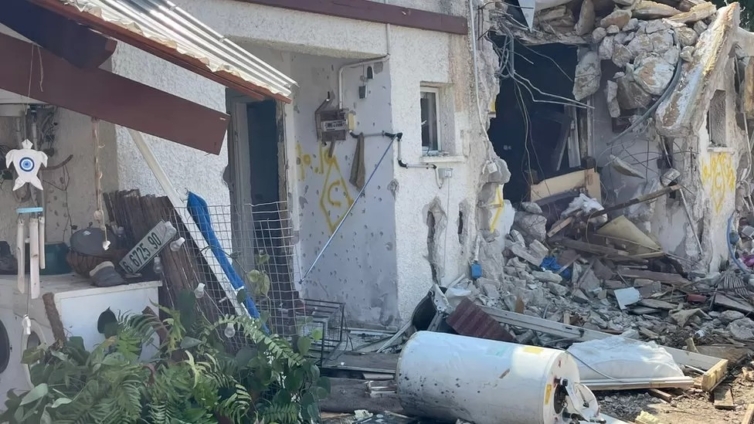Warning: This article contains details that some readers may find disturbing
Kibbutz Kfar Aza is a microcosm of the first few days of this war, and also a glimpse of what might come next.
Until this morning fighting was still going on in the kibbutz, which is one of the Israeli communities along the border with Gaza. That's why only now are they collecting the bodies of its Israeli residents who were killed when Hamas broke through the border wire from Gaza early on Saturday morning.
Soldiers who spent much of the day in the ruins recovering bodies of civilians said that there had been a massacre. It seems likely that much of the killing happened in the first hours of the assault on Saturday.
The Israeli army, caught off guard, took 12 hours to get to the kibbutz, said Davidi Ben Zion, the deputy commander of Unit 71, an experienced team of paratroopers who led the assault.
"Thank God we saved many lives of many parents and children," he said. "Unfortunately, some were burned by Molotov [cocktails]. They are very aggressive, like animals."
Mr Ben Zion said Hamas gunmen who killed families, including babies, were "just a jihad machine to kill everybody, [people] without weapons, without nothing, just normal citizens that want to take their breakfast and that's all."
Some of the victims, he said, were decapitated.
"They killed them and cut some of their heads, it's a dreadful thing to see… and we must remember who is the enemy, and what our mission is, [for] justice where there is a right side and all the world needs to be behind us."
Another officer pointed to a bloodied purple sleeping bag. A swollen toe poked out. He said the woman underneath had been killed and decapitated in her front garden. I did not ask the officer to move the sleeping bag to inspect her body. A few yards away was the blackened, swollen corpse of a dead Hamas gunman.
Kibbutz Kfar Aza adds to the considerable evidence that is accumulating of war crimes by Hamas gunmen. Like their Israeli neighbours, the community was taken by surprise.
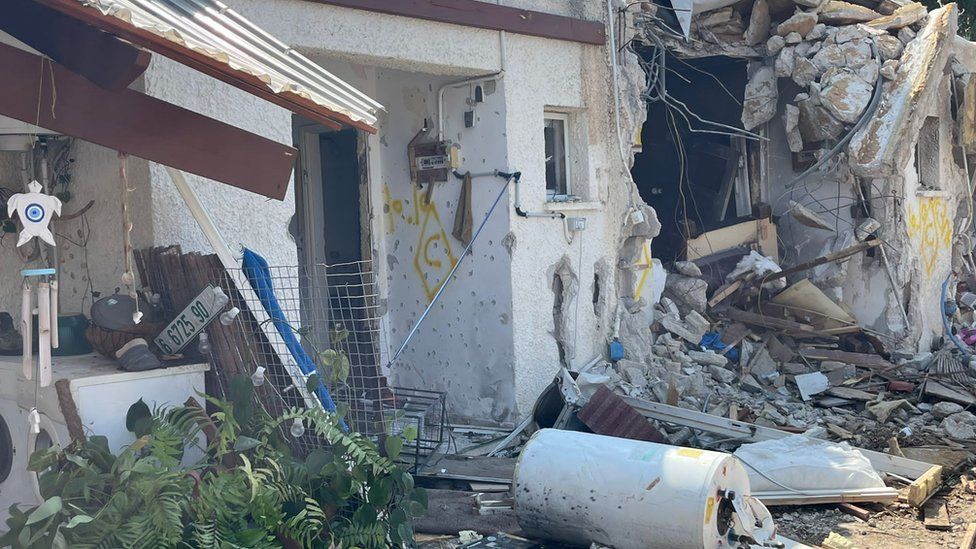
Its first line of defence was the kibbutz guard, residents with military experience who patrolled the perimeter. They were killed fighting the attackers.
Their bodies were removed this morning from their positions in the centre of the kibbutz, and like the other Israeli dead, wrapped in black plastic, carried in stretchers to a parking area and laid in a line waiting to be recovered.
The residents of the Israeli border communities expected periodic rocket attacks after Hamas seized control of Gaza in 2007. They accepted the danger as the price of country life in a tight knit community which still had traces of the pioneer spirit of early Zionist settlements.
Residents of Kfar Aza, and the other Israeli communities along the Gaza wire, enjoyed a good quality of life, despite the threat from Hamas rockets. In the houses, lawns and open areas of the kibbutz, a concrete shelter was never more than a dash away.
All the houses had reinforced safe rooms. They also had outside terraces, barbeques, swings for the children and fresh air.
But no-one - here in Kfar Aza or elsewhere in Israel - imagined Hamas would be able to breach Israel's defences and kill so many people.
The horror and rage of Israelis has been mixed with incredulity that the state and the military failed in its fundamental duty to protect its citizens.
The bodies of dead Hamas gunmen who killed so many of them have been left rotting in the sun, lying uncovered where they were killed in bushes and ditches and the broad lawns of the kibbutz.
Near their bodies are the motorcycles they used to storm into the kibbutz after they broke through the border wire. The wreckage of a paraglider, used to fly over Israel's defences, is there too, pushed off a path on to a flower bed.
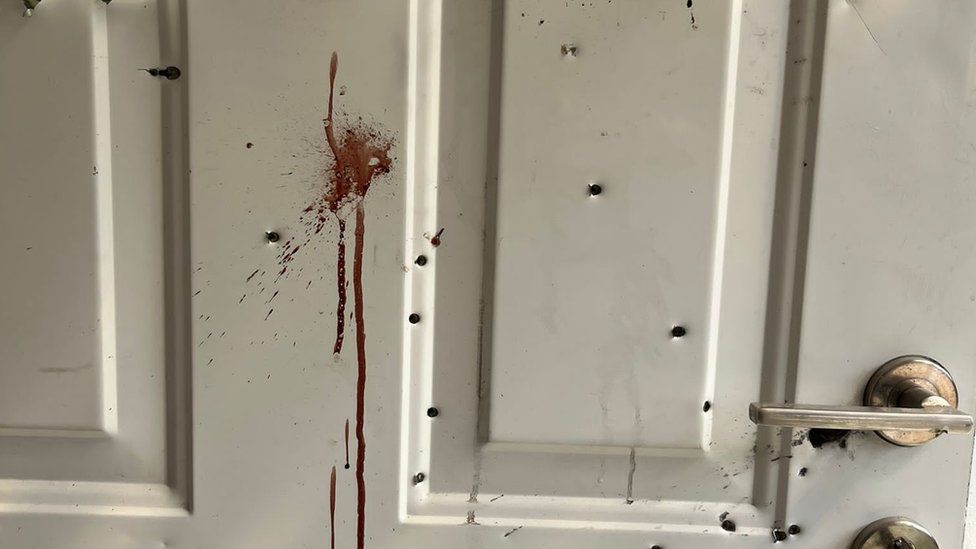
The next common experience with other border settlements was that it took a fierce fight for the Israelis to recapture Kfar Aza.
As we approached the kibbutz entrance this morning, hundreds of Israeli combat soldiers were still deployed along its perimeter. We could hear their radio traffic.
A commander was giving the order to open fire at a building on the Gaza side. Almost immediately bursts of fire from automatic weapons started, directed across the border into Gaza.
The deep thud of airstrikes echoed continually out of Gaza while we were in Kfar Aza.
Israel is suffering a collective trauma after the killing of so many of their fellow citizens on Saturday.
But in Gaza, hundreds of civilians are also being killed. International humanitarian law states clearly that all combatants must protect the lives of civilians.
It is clear that the killing of hundreds of civilians by the Hamas attackers is grave violation of the laws of war. Israelis reject any comparison between the way Hamas kills civilians and the way Palestinian civilians die in their air strikes.
Major General Itai Veruv, who was about to retire when he led the fight to take back the kibbutz, insisted that Israel was respecting its obligations under the laws of war.
"I'm sure we fight for our values and culture… we will be very aggressive and very strong but we keep our moral values. We are Israeli, we are Jewish."
He denied strongly that they had suspended their obligations under the laws of war. It is certain though that as more Palestinian civilians die, Israel will face stronger and stronger criticism.
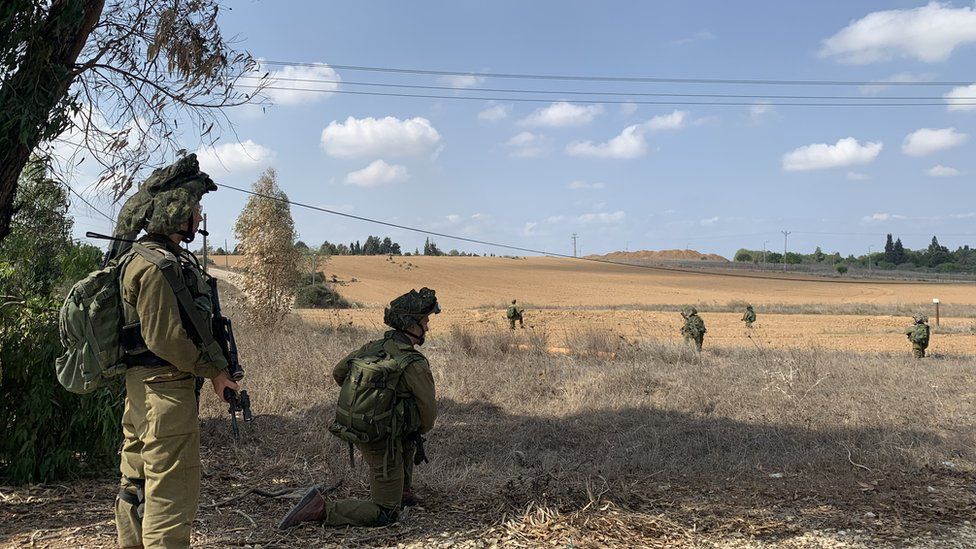
That is part of the glimpse of the future afforded by Kfar Aza. So is the attitude of a soldier I spoke to, who didn't want to give his name. Like so many other Israelis, the experience of the first few days of this war, and what he has seen, hardened his resolve to fight.
When they arrived, he said it was "chaos, terrorists everywhere."
How difficult, I asked, was the fighting?
"You cannot imagine."
Have you ever had to do anything like this before as a soldier?
"Not like this."
What happens next?
"I don't know, I do what they tell me to do. I hope we will go inside."
Into Gaza? That would be tough fighting.
"Yes. We're ready for it."
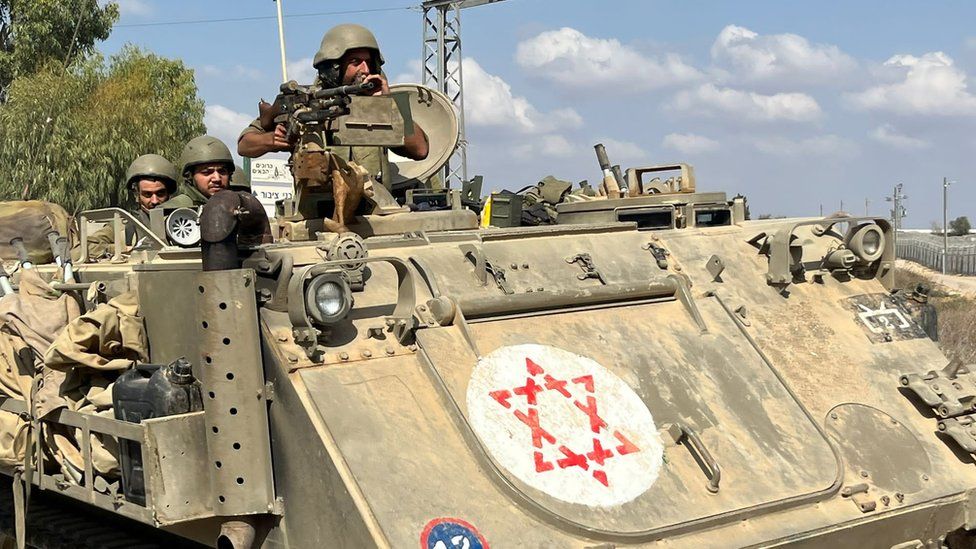
The soldiers were mostly from reserve units. Historically, military service was considered a vital part of nation-building, uniting a country that can be fractious.
Davidi Ben Zion, the officer who led the first wave into the fight for the kibbutz and saw the carnage left by Hamas, acknowledged Israelis had deep political divisions - but insisted they were united now that they were under attack.
A strong smell of decomposing flesh hung in the hot autumn sun of the Mediterranean. Soldiers removing the bodies walked carefully through the ruins of houses, wary of unexploded ordnance, that might also be boobytrapped. A grenade lay on a garden path.
As they worked to recover the bodies, from time to time alerts for Hamas rocket fire made them take cover.
After we left Kfar Aza there were more alerts.
Latest Stories
-
Asante Mamponghene’s burial rites attract thousands of mourners
52 minutes -
“The job was waiting for me”: MTN Ghana CFO shares journey into telecoms
1 hour -
Frema Foundation Launches ‘Dignity in Bloom’ initiative to tackle period poverty in Ashanti Region
2 hours -
Mayor of Accra calls for renewed commitment to climate action as city commemorates June 3 disaster
2 hours -
Declaration of assets: Special Prosecutor should lead call for asset publication – Dafeamekpor
2 hours -
Empower360 completes third training session for 30 young women under Ghana Grows Program
3 hours -
Sudan: A new gov’t amid escalating military-political conflicts and a deepening humanitarian crisis
3 hours -
National Vaccine Institute makes impressive strides, activate measures for drug production
3 hours -
Ministry of Works and Housing signs MoU for water exploration in Ghana
3 hours -
Tree for Life initiative takes off
4 hours -
FDA destroys counterfeit pharmaceutical products worth GH₵42m
4 hours -
First responsibly mined Ghanaian gold bars presented to Asantehene
5 hours -
Two notorious robbers jailed for a series of attacks in Wa
5 hours -
Ofori-Atta must first be arrested before any trial in absentia – OSP clarifies
5 hours -
QNET reaffirms ethical business practices following false media allegations in Ghana and Burkina Faso
5 hours

